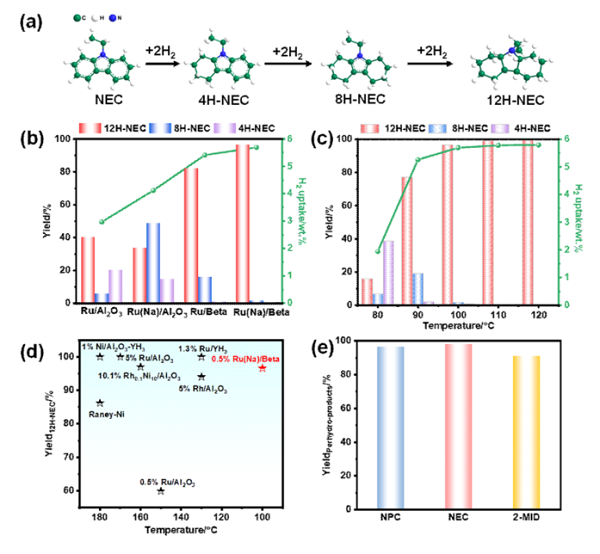Research Progress
Motivated by such a challenge, a research team led by Prof. CHEN Xinqing at Shanghai Advanced Research Institute (SARI) of the Chinese Academy of Sciences developed a new strategy utilizing Ru single atoms and *BEA zeolite to synergistically catalyze hydrogen storage of liquid organic hydrogen carriers (LOHCs) with superior performance.
The research results were published in Applied Catalysis B: Environmental.
Atomically dispersed Ru supported on *BEA zeolite was prepared by deposition precipitation for LOHCs. It is found that highly dispersed Ru single-atoms boost hydrogen activation and the strong acid sites of zeolites promote the hydrogen spillover on the hydrogenation with N-heterocycles.
Moreover, the synergistic effect of Ru single atoms and *BEA zeolite is crucial for accelerating the hydrogenation rate and lowering the activation energy compared with traditional Ru-based catalysts.
The synergistic catalysis of Ru single-atoms and zeolite with the assistance of hydrogen spillover exhibited excellent hydrogenation activity of N-ethylcarbazole (NEC), N-propylcarbazole (NPC), and 2-methylindole (2-MID) at lower temperatures with lower Ru content (0.5 wt%).
The study of Ru single-atoms and zeolite synergistic catalysis provides a new strategy for the synergetic catalysis of zeolite-supported metal catalysts for fast hydrogen storage into aromatic LOHCs under mild conditions.

Hydrogenation performance of N-ethylcarbazole (NEC) of different catalysts and comparison results of literature
(Image by SARI)
Cotact: CHEN Xinqing
Shanghai Advanced Research Institute
chenxq@sari.ac.cn





